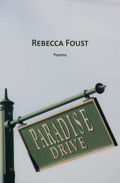
 |
laundry one neatly sorts
into blacks and whites;
it is gray with children."
Rebecca Foust's Paradise Drive is a bold, yet enriching examination and exploration of one's morality, particularly in the rapidly evolving society of the 21st century. Through Pilgrim, the central figure in many of the poems, the collection of sonnets flows like a narrative that ends up proposing one penetrating question: is despair, whether rich or poor, ubiquitous and unyielding?
Poetry, often by its form and function, is grouped together. Rarely can a collection break the assumed bond of conformity in both form and function and venture into a world that feels all too real. Paradise Drive does exactly this. Rather than sticking to the age-old form of sonnets, particularly with rhyme scheme, Foust chooses to build pace and rhythm with the use of repeating syntax and exceptional employment of parallelism. Her full repertoire of poetic devices is on full display. Among other devices, timely use of satire, irony, metaphor, imagery, and alliteration allow Foust to seamlessly transfer the vision in her mind into the imagination of the reader.
While Foust's writing style is undoubtedly spectacular, her extensive experience in poetry, past and present, results in a well balanced compilation, drawing inspiration from both prominent poets in history like William Wordsworth, Emily Dickinson, and more contemporary poets like Sylvia Plath. Reading Paradise Drive is like digging blindly into a bag of assorted chocolates: no matter how many times you dig in, you're likely to find something sweet and appealing to the senses.
Foust's use of well-timed breaks in between phrases is likely to send readers into a trance-like state. Interestingly, she is able to express her views on certain aspects of today's society without disrupting the musical harmony of the piece. In "Cocktail Party," Pilgrim, who is by no means portrayed as a perfect individual, is fed up with the drug-fueled, pretentiousness of high-class society, and spends her entire time locked in a bathroom reading The Cantos. The speaker of the poem clearly depicts this action as an antidote to the twitter out there.
Perhaps the most intriguing portion of the whole compilation is "The Seven Deadly Sins Overheard at the Party." The allegorical characters Greed, Pride, Envy, Lust, Wrath, Gluttony, and Sloth are engaged in their respective conversations, exemplifying their personal traits through dialogue. This send-up of the seven deadly sins is not only creative and enjoyable, but also splendidly reminiscent of Geoffrey Chaucer's Canterbury Tales as well as the fifteenth-century, morality-based play, Everyman. Needless to say, Foust is a literary historian who also possesses the tact to fuse her knowledge into her own work.
In most anthologies or collections of poetry, there is no connection between poems; however, in Paradise Drive, Pilgrim is the thread that keeps the poems together and the readers engaged. One of the more entertaining poems, "The One Pilgrim Likes Best," gives readers a stirring example of simile as Foust compares "the limestone walks to houses glowing like over-lit cruise boats docked under the old oaks." While "Prime Mover" goes into the heavy aspect of life, including divorce and financial difficulty, the speaker's mantra of working hard never wavers.
Myriad current world topics are discussed, be it the relative ignorance many have toward autism, the movement toward a healthy mental state through yoga and meditation, or the need to understand, as demonstrated in "How to Live, Reprise," that people are neither black nor white, but rather gray. In addition to modern-day dilemmas, Foust appeals to history, mythology, and art aficionados with references to Augustine, Archimedes, and even the impressionist painter, Paul Gauguin. It is rare to see works as thorough and relevant as Paradise Drive.
Frankly, every poem in Paradise Drive has meaning and substance that can be fleshed out into its own essay. For anyone that enjoys well-rounded poetry that utilizes both the past and present and ignites one's cognitive fire, not reading Paradise Drive would be a travesty.
RECOMMENDED by the US Review